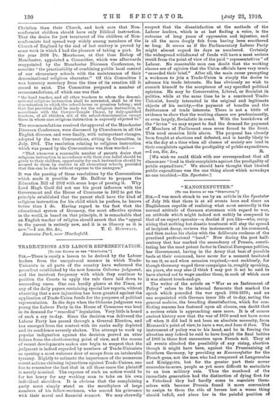TRADE-UNIONS AND LABOUR REPRESENTATION.
[To Ma EDITOR OP Tsa " SPICTATOR.1 SIR,—There is surely a lesson to be derived by the Labour leaders from the unequivocal manner in which Trade- Unionists in all parts of the country have welcomed the precedent established by the now famous Osborne judgment, and the insistent frequency with which they continue to petition the Courts to apply the rule there laid down to succeeding cases. One can hardly glance at the Times, or any of the daily papers containing special law reports, without observing that a new injunction has been granted against the application of Trade-Union funds for the purposes of political representation. In the days when the Osborne judgment was young the Labour Party in the House of Commons was loud in its demand for "remedial " legislation. Very little is heard of such a cry to-day. Since the decision was delivered the Labour Party has passed through a General Election, and has emerged from the contest with its ranks sadly depleted and its confidence severely shaken. The attempt to work up popular indignation against the decision proved an utter failure from the electioneering point of view, and the course of recent developments makes one begin to suspect that the judgment is indeed regarded by numbers of Trade-Unionists as opening a most welcome door of escape from an intolerable tyranny. Rightly to estimate the importance of the numerous recent actions claiming injunctions against Trade-Unions, one has to remember the fact that in all these cases the plaintiff is merely nominal. The expense of such an action would be far too heavy for any working man to take on his own individual shoulders. It is obvious that the complaining party must simply stand as the mouthpiece of large numbers of his fellow-workmen, who second his grievance with their moral and financial support. We may shrewdly
suspect that the dissatisfaction at the methods of the Labour leaders, which is at last finding a voice, is the outcome of long years of oppression and injustice, and is all the more deeply felt from having been smothered so long. It seems as if the Parliamentary Labour Party might almost regard its days as numbered. Certainly the widespread withdrawal of funds will have a most serious result from the point of view of the paid " representatives " of Labour. No reasonable man can doubt that the working classes are of opinion that the Union officials have very much "exceeded their brief." After all, the main cause prompting a workman to join a Trade-Union is simply the desire to advance his trade interests. He has obviously no wish to commit himself to the acceptance of any specified political opinions. He may be Conservative, Liberal, or Socialist in politics, while at the same time he is a convinced Trade- Unionist, keenly interested in the original and legitimate objects of his society,—the payment of benefits and the furtherance of trade interests. There is not a tittle of evidence to show that the working classes are predominantly, or even largely, Socialistic in creed. With the breakdown of the " levies " we may expect to find the demand for payment of Members of Parliament once more forced to the front. This need occasion little alarm. The proposal has already been fought at elections and defeated, and is hardly likely to win the day at a time when all classes of society are loud in their complaints against the prodigality of public expenditure.
[We wish we could think with our correspondent that all classes are "loud in their complaints against the prodigality of public expenditure." We should have thought that bloated public expenditure was the one thing about which nowadays no one troubled.—ED. Spectator.'






































 Previous page
Previous page